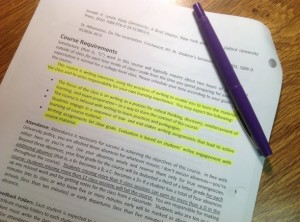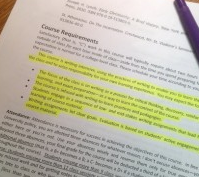Writing a paper can be a painful experience for some students, and in the last four years, it’s a task that has become harder to avoid at St. Thomas.
The number for courses designated as writing intensive has been steadily rising since the fall 2009, when there were only five. Thirty-six courses are designated writing intensive this semester, with even more professors using some writing intensive strategies while forgoing the official designation.

The St. Thomas website states writing intensive courses “focus on writing as a process and product,” while students receive instruction and feedback from their professor.
Theology professor Mark DelCogliano said that in his writing intensive courses, he encourages using writing as a tool for understanding.
“You don’t really understand something unless you’re able to write about it,” DelCogliano said. “If you have to write about a text, it forces you to reflect on it.”
Senior Alyssa Hollenback said she prefers writing an essay rather than taking an exam, which is why she favors writing intensive classes.
“I’ve found that in (writing intensive) courses I’ve had personally, that it’s less repetition and just spilling facts to someone,” Hollenback said.
DelCogliano said in his experience, writing intensive courses tend to benefit poor writers the most because he can recognize their issues and provide direction.
Hollenback, who works at the Center for Writing, said students in writing intensive courses often seek help from the center.
“I think that students decide to take things a little more seriously knowing that their grade is reflecting their writing a lot more than things like tests,” Hollenback said.
Sophomore David Gustafson is taking his first writing intensive course this semester.
“I’m a writer,” Gustafson said. “I’m not worried.”
Gustafson is taking an art history class, and said he thinks essay-writing is a better form of assessment for this subject because tests would be more subjective.
“With a test, you’d have a harder time getting a decent grade because you’d have to write what the teacher wants as opposed to what you find to be important about an object,” Gustafson said. “With writing you can make a case as to why the object is important.”
Senior Tyler Erstad said while he acknowledges the benefits of writing intensive courses, writing isn’t his specialty.
“I’m a more analytical person,” Erstad said. “I’d prefer to have a test or a project.”
Erstad also said tests help him retain information better than writing a paper would.
For Delcogliano, teaching students to write will help prepare them for the real world.
“I think writing is a really essential skill,” DelCogliano said. “Writing is the result of thinking and analyzing. Those skills of knowing how to analyze are very important.”
Grace Pastoor can be reached at past6138@stthomas.edu.



